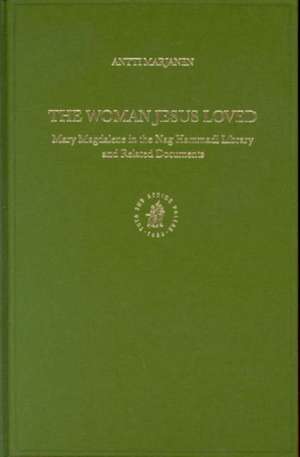The Woman Jesus Loved: Mary Magdalene in the Nag Hammadi Library and Related Documents: Nag Hammadi and Manichaean Studies, cartea 40
Autor Antti Marjanenen Limba Engleză Hardback – 31 iul 1996
Special attention is paid to the way Mary is presented in relation to other disciples, and to how her portrait pertains to gender imagery used in the writings. Detailed text analyses, based on a careful philological study, show that no uniform picture and use of the figure of Mary can be traced. Contrary to a common supposition, the book also demonstrates that the positive view of Mary displayed in the texts does not automatically imply a positive attitude towards women in general.
The work provides a basis for all further discussion of Mary Magdalene in the Nag Hammadi and related documents.
Din seria Nag Hammadi and Manichaean Studies
- 18%
 Preț: 928.80 lei
Preț: 928.80 lei - 18%
 Preț: 674.70 lei
Preț: 674.70 lei - 18%
 Preț: 590.66 lei
Preț: 590.66 lei - 18%
 Preț: 679.64 lei
Preț: 679.64 lei - 18%
 Preț: 706.55 lei
Preț: 706.55 lei - 18%
 Preț: 630.20 lei
Preț: 630.20 lei - 18%
 Preț: 759.36 lei
Preț: 759.36 lei - 18%
 Preț: 555.92 lei
Preț: 555.92 lei - 18%
 Preț: 1662.52 lei
Preț: 1662.52 lei - 18%
 Preț: 2015.06 lei
Preț: 2015.06 lei - 18%
 Preț: 882.35 lei
Preț: 882.35 lei - 18%
 Preț: 1004.49 lei
Preț: 1004.49 lei - 18%
 Preț: 1128.56 lei
Preț: 1128.56 lei - 18%
 Preț: 998.55 lei
Preț: 998.55 lei - 18%
 Preț: 2655.25 lei
Preț: 2655.25 lei - 18%
 Preț: 1178.30 lei
Preț: 1178.30 lei - 18%
 Preț: 1886.94 lei
Preț: 1886.94 lei - 18%
 Preț: 1244.05 lei
Preț: 1244.05 lei - 18%
 Preț: 723.17 lei
Preț: 723.17 lei - 18%
 Preț: 1072.11 lei
Preț: 1072.11 lei - 18%
 Preț: 917.14 lei
Preț: 917.14 lei - 18%
 Preț: 834.62 lei
Preț: 834.62 lei - 18%
 Preț: 857.97 lei
Preț: 857.97 lei - 18%
 Preț: 778.26 lei
Preț: 778.26 lei - 18%
 Preț: 869.89 lei
Preț: 869.89 lei - 18%
 Preț: 1063.79 lei
Preț: 1063.79 lei - 18%
 Preț: 1420.35 lei
Preț: 1420.35 lei - 18%
 Preț: 1334.10 lei
Preț: 1334.10 lei - 18%
 Preț: 666.37 lei
Preț: 666.37 lei - 18%
 Preț: 703.86 lei
Preț: 703.86 lei - 18%
 Preț: 884.06 lei
Preț: 884.06 lei - 18%
 Preț: 679.09 lei
Preț: 679.09 lei - 18%
 Preț: 720.31 lei
Preț: 720.31 lei - 18%
 Preț: 1017.73 lei
Preț: 1017.73 lei - 18%
 Preț: 742.37 lei
Preț: 742.37 lei - 18%
 Preț: 716.43 lei
Preț: 716.43 lei - 18%
 Preț: 715.60 lei
Preț: 715.60 lei - 18%
 Preț: 887.64 lei
Preț: 887.64 lei - 18%
 Preț: 819.20 lei
Preț: 819.20 lei - 18%
 Preț: 868.59 lei
Preț: 868.59 lei - 18%
 Preț: 680.60 lei
Preț: 680.60 lei - 18%
 Preț: 1237.94 lei
Preț: 1237.94 lei - 18%
 Preț: 595.83 lei
Preț: 595.83 lei - 18%
 Preț: 1177.08 lei
Preț: 1177.08 lei - 18%
 Preț: 1317.58 lei
Preț: 1317.58 lei - 18%
 Preț: 924.58 lei
Preț: 924.58 lei - 18%
 Preț: 1129.60 lei
Preț: 1129.60 lei - 18%
 Preț: 1047.67 lei
Preț: 1047.67 lei - 18%
 Preț: 1878.12 lei
Preț: 1878.12 lei
Preț: 875.26 lei
Preț vechi: 1067.39 lei
-18% Nou
Puncte Express: 1313
Preț estimativ în valută:
167.53€ • 182.04$ • 140.82£
167.53€ • 182.04$ • 140.82£
Carte indisponibilă temporar
Doresc să fiu notificat când acest titlu va fi disponibil:
Se trimite...
Preluare comenzi: 021 569.72.76
Specificații
ISBN-13: 9789004106581
ISBN-10: 9004106588
Pagini: 264
Dimensiuni: 155 x 235 x 23 mm
Greutate: 0.63 kg
Editura: Brill
Colecția Brill
Seria Nag Hammadi and Manichaean Studies
ISBN-10: 9004106588
Pagini: 264
Dimensiuni: 155 x 235 x 23 mm
Greutate: 0.63 kg
Editura: Brill
Colecția Brill
Seria Nag Hammadi and Manichaean Studies
Public țintă
All those interested in the Nag Hammadi writings, Gnosticism, Manichaeism, gender studies, and the role of women in Early Christianity.Notă biografică
Antti Marjanen, Th.D. (1996), University of Helsinki, is working on the research project of the Academy of Finland on Gnosticism and Early Christian Culture. He has published extensively on the Nag Hammadi writings and Gnosticism.
Recenzii
'Mit scharfsinniger Gelehrsamkeit und philologischem Geschick untersucht er die uns heute zugänglichen gnostischen Texte der ersten drei Jahrhunderte, in denen sich Maria Magdalena-Traditionen widerspiegeln, und macht sie für die fortlaufende exegetische, theologische und soziologische Diskussion fruchtbar.'
Gesina Schenke-Robinson, Theologische Literaturzeitung, 1997.
Gesina Schenke-Robinson, Theologische Literaturzeitung, 1997.
